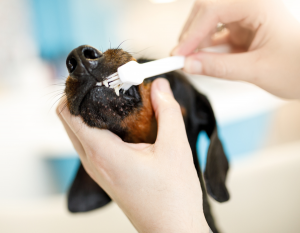It’s February and you know what that means… it’s National Pet Dental Health Month! Okay, so maybe you didn’t know but now you do. Every February, the American Veterinary Medical Association sponsors this observance to bring awareness to the importance of oral health care for our furry friends. Aside from avoiding the dreaded “dog breath,” there are plenty of benefits to caring for your pup’s teeth.
You may be wondering “do I really need to worry about my dog’s teeth?” To keep things short and sweet – yes.
“Teeth don’t get enough credit,” says Dr. Jennifer Kotouch, Director of Veterinary Services at the ARC. “Poor oral health can cause a significant impact on an animal’s quality of life and can be a major source of pain and discomfort for your pet.”
Aside from physical health, dental problems can lead to negative changes in behavior. Dr. Kotouch notes that “although our pets tend to hide their pain well, they may become irritable and aggressive, or change their eating habits as a result.”
So, how do you know if your pup’s mouth is healthy? Dr. Kotouch says to keep an eye out for the following:
- Red gums
- Foul breath
- Stained or discolored teeth
- Plaque and tartar build-up
- Decreased appetite, reluctance to eat or dropping food
- Excessive drooling
- Blood in your pet’s water bowl
- Swelling of the face
Ideally, your dog’s gums should be moist and light pink with no signs of redness, swelling or discharge. Red gums are a potential sign of gingivitis, AKA gum disease. Some dogs have naturally occurring black spots in their gums – this is known as “mottling,” and is nothing to be concerned about unless it is not typical for your dog.
Most people wouldn’t describe a dog’s breath as fresh, but if you can smell your pup’s mouth from a mile away, a trip to the vet may be in order. “Halitosis, commonly known as bad breath, is an indicator that something is wrong,” says Dr. Kotouch. “It’s commonly caused by a build-up of bacteria thanks to plaque and tartar, but it could also be a sign of infection.”

When it comes to doggy dental care, an ounce of prevention is worth a pound of cure. Regularly brushing your pet’s teeth greatly reduces their chances of periodontal disease, but make sure you have the proper tools and use products specifically labeled for veterinary dental care. Products such as human toothpaste are toxic to pets and can cause serious health problems or even death. If you aren’t sure a product is safe to use, please talk with your veterinarian.